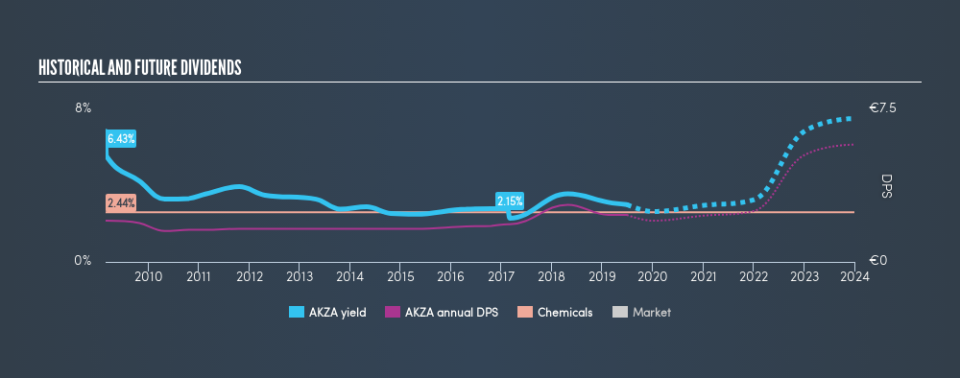Should Akzo Nobel N.V. (AMS:AKZA) Be Part Of Your Income Portfolio?

Want to participate in a short research study? Help shape the future of investing tools and you could win a $250 gift card!
Could Akzo Nobel N.V. (AMS:AKZA) be an attractive dividend share to own for the long haul? Investors are often drawn to strong companies with the idea of reinvesting the dividends. If you are hoping to live on the income from dividends, it's important to be a lot more stringent with your investments than the average punter.
A 2.8% yield is nothing to get excited about, but investors probably think the long payment history suggests Akzo Nobel has some staying power. The company also bought back stock during the year, equivalent to approximately 14% of the company's market capitalisation at the time. Some simple research can reduce the risk of buying Akzo Nobel for its dividend - read on to learn more.
Explore this interactive chart for our latest analysis on Akzo Nobel!
Payout ratios
Dividends are typically paid from company earnings. If a company pays more in dividends than it earned, then the dividend might become unsustainable - hardly an ideal situation. So we need to form a view on if a company's dividend is sustainable, relative to its net profit after tax. Akzo Nobel paid out 119% of its profit as dividends, over the trailing twelve month period. Unless there are extenuating circumstances, from the perspective of an investor who hopes to own the company for many years, a payout ratio of above 100% is definitely a concern.
In addition to comparing dividends against profits, we should inspect whether the company generated enough cash to pay its dividend. Akzo Nobel paid out 575% of its free cash flow last year, which we think is concerning if cash flows do not improve. Paying out such a high percentage of cash flow suggests that the dividend was funded from either cash at bank or by borrowing, neither of which is desirable over the long term. Cash is slightly more important than profit from a dividend perspective, but given Akzo Nobel's payouts were not well covered by either earnings or cash flow, we would definitely be concerned about the sustainability of this dividend.
Consider getting our latest analysis on Akzo Nobel's financial position here.
Dividend Volatility
One of the major risks of relying on dividend income, is the potential for a company to struggle financially and cut its dividend. Not only is your income cut, but the value of your investment declines as well - nasty. For the purpose of this article, we only scrutinise the last decade of Akzo Nobel's dividend payments. Its dividend payments have fallen by 20% or more on at least one occasion over the past ten years. During the past ten-year period, the first annual payment was €2.03 in 2009, compared to €2.31 last year. Dividends per share have grown at approximately 1.3% per year over this time. The dividends haven't grown at precisely 1.3% every year, but this is a useful way to average out the historical rate of growth.
It's good to see some dividend growth, but the dividend has been cut at least once, and the size of the cut would eliminate most of the growth, anyway. We're not that enthused by this.
Dividend Growth Potential
With a relatively unstable dividend, it's even more important to see if earnings per share (EPS) are growing. Why take the risk of a dividend getting cut, unless there's a good chance of bigger dividends in future? Over the past five years, it looks as though Akzo Nobel's EPS have declined at around 11% a year. If earnings continue to decline, the dividend may come under pressure. Every investor should make an assessment of whether the company is taking steps to stabilise the situation.
Conclusion
To summarise, shareholders should always check that Akzo Nobel's dividends are affordable, that its dividend payments are relatively stable, and that it has decent prospects for growing its earnings and dividend. Akzo Nobel paid out almost all of its cash flow and profit as dividends, leaving little to reinvest in the business. Second, earnings per share have been in decline, and its dividend has been cut at least once in the past. In this analysis, Akzo Nobel doesn't shape up too well as a dividend stock. We'd find it hard to look past the flaws, and would not be inclined to think of it as a reliable dividend-payer.
Without at least some growth in earnings per share over time, the dividend will eventually come under pressure either from costs or inflation. Businesses can change though, and we think it would make sense to see what analysts are forecasting for the company.
We have also put together a list of global stocks with a market capitalisation above $1bn and yielding more 3%.
We aim to bring you long-term focused research analysis driven by fundamental data. Note that our analysis may not factor in the latest price-sensitive company announcements or qualitative material.
If you spot an error that warrants correction, please contact the editor at editorial-team@simplywallst.com. This article by Simply Wall St is general in nature. It does not constitute a recommendation to buy or sell any stock, and does not take account of your objectives, or your financial situation. Simply Wall St has no position in the stocks mentioned. Thank you for reading.

 Yahoo Finance
Yahoo Finance 
